Key takeaways
- Parenting workshops provide a supportive environment for parents to share challenges and gain practical strategies, fostering a sense of community.
- Community center programs are accessible and diverse, allowing parents to connect with others and build a lasting support network.
- Effective workshop participation involves active engagement, setting realistic expectations, and focusing on one or two key takeaways to avoid feeling overwhelmed.
- Applying workshop lessons at home requires patience and teamwork with partners to reinforce new parenting techniques and create meaningful family discussions.
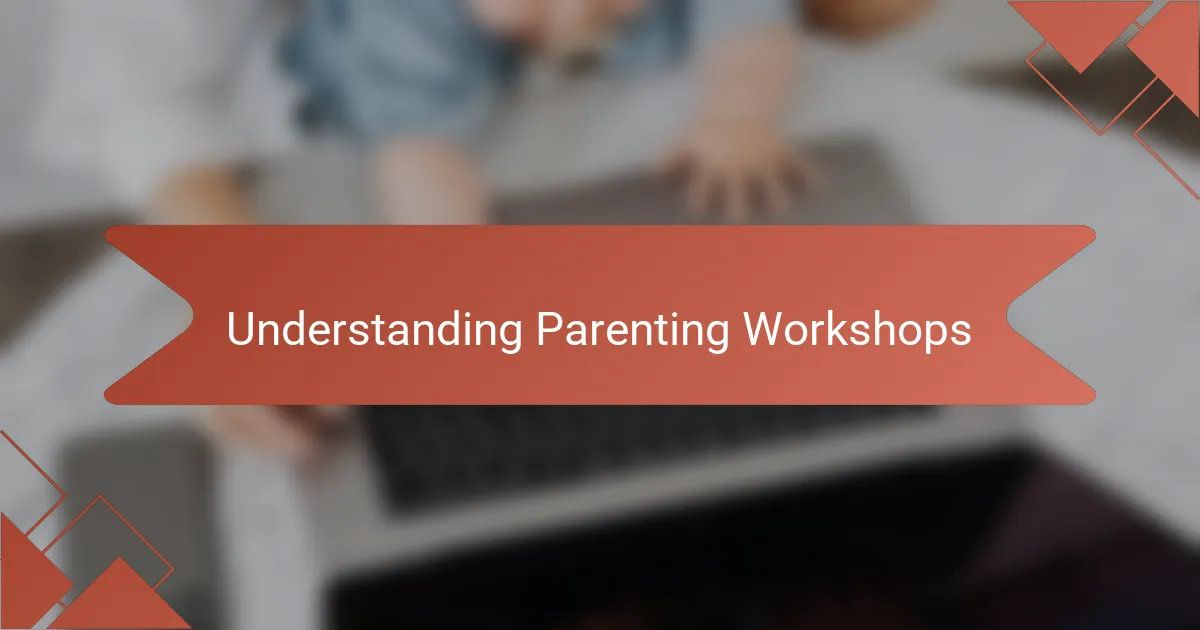
Understanding Parenting Workshops
Parenting workshops, in my experience, serve as invaluable spaces where parents gather to share challenges and learn practical strategies. Have you ever felt overwhelmed by conflicting advice online? These workshops cut through the noise by offering guidance grounded in real-life experiences and expert knowledge.
What struck me most about parenting workshops is their focus on fostering connection—not just between parent and child, but among parents themselves. Sitting in those rooms, I often felt a comforting sense of solidarity, realizing that my struggles were far from unique. It’s encouraging to know you’re not navigating this journey alone.
I’ve noticed that understanding the structure and goals of these workshops helps set realistic expectations. They’re not magic fixes but tools that gradually build confidence and skill. So, what questions do you bring to the table when you attend one? Reflecting on this helped me get the most from each session.
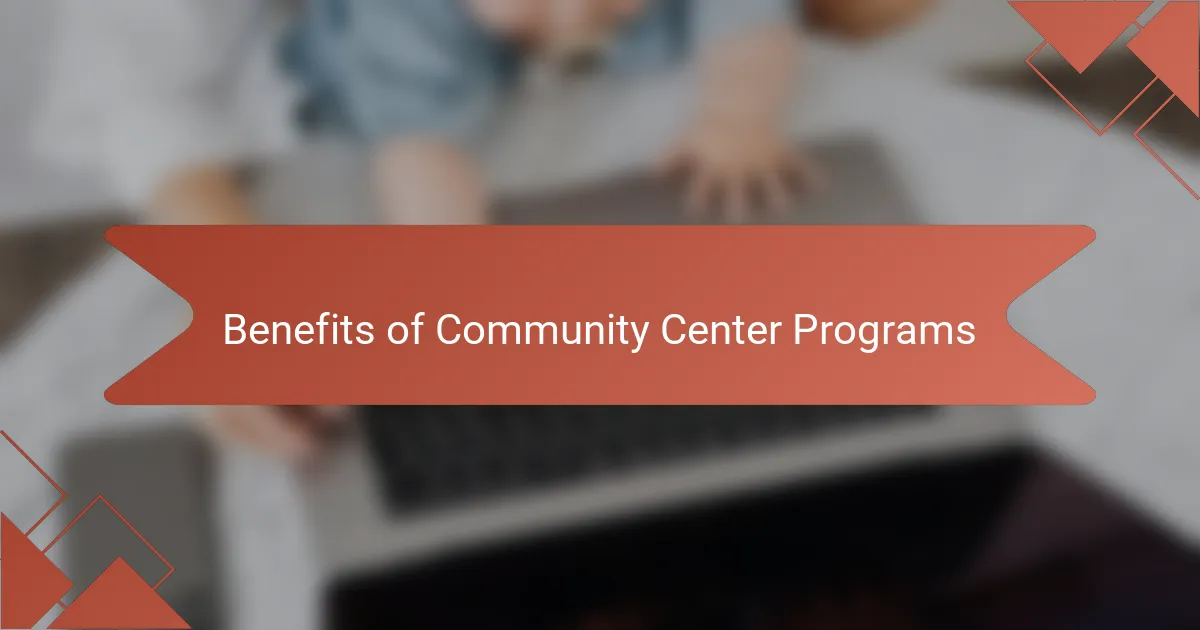
Benefits of Community Center Programs
One of the biggest benefits I’ve found in community center programs is the accessibility they offer. Unlike costly private sessions, these workshops often come at little to no expense, making quality parenting support available to many families. Have you ever hesitated to join a program because of the price? That barrier simply melts away here.
Another upside that really stood out to me is the diversity of perspectives you encounter. Community centers bring together parents from all walks of life, which broadens your understanding and opens your mind to new approaches. It’s like joining a mini village where everyone’s experiences enrich your own parenting journey.
Lastly, the ongoing support these programs provide feels incredibly grounding. It’s not just a one-off meeting but a chance to build lasting relationships and a support network you can lean on during tough times. When I think back to my early parenting days, knowing I had that circle made all the difference. Have you found that having consistent, local support changes how you handle challenges? For me, it absolutely did.

How to Choose the Right Workshop
Choosing the right workshop often starts with asking yourself what you truly need. When I first looked for one, I juggled between sessions focused on discipline techniques and those about emotional connection. What resonated most with me was the workshop that aligned with the specific challenges I faced at that moment—so pinpointing your current parenting questions can narrow down your options effectively.
I also learned to check who leads the workshop and their approach. Sometimes, experts use jargon or rigid methods that didn’t quite fit my style or values. Have you ever sat through a session feeling more confused than helped? Finding facilitators whose communication feels clear and relatable made all the difference in how engaged and hopeful I felt afterward.
Scheduling and format also play a big role. Early on, I picked a workshop that was impossible to attend consistently because of my work hours. It was frustrating to miss key parts, so I eventually looked for sessions with flexible times or even hybrid online options. Does the workshop fit your lifestyle, or is it another stressor? That question helped me choose a setting where I could show up fully, ready to learn.
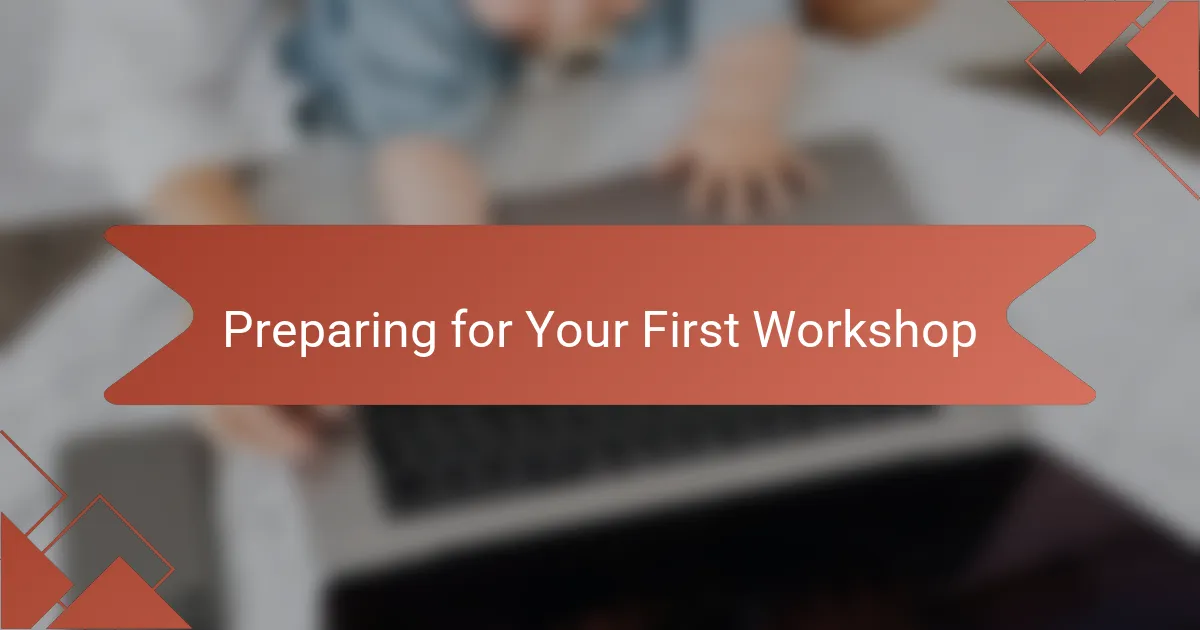
Preparing for Your First Workshop
Preparing for your first workshop felt a bit like stepping into unfamiliar territory for me. I remember wondering, “What should I bring? Will I fit in?” To ease that anxiety, I made a checklist—notebook, questions I wanted answered, and an open mind—which helped me feel more in control and ready to engage.
I also found it useful to set a small intention before walking in, like “I’m here to learn one new thing today.” It kept my expectations realistic and prevented me from feeling overwhelmed by the wealth of information shared. Have you tried focusing on just one takeaway? For me, it transformed the experience from intimidating to manageable.
Another thing I didn’t anticipate was the comfort of arriving early. Sitting quietly before the workshop started gave me time to observe the room, chat with other parents, and settle my thoughts. That moment of calm made me feel less like a newcomer and more like part of a community—something I truly cherish now.
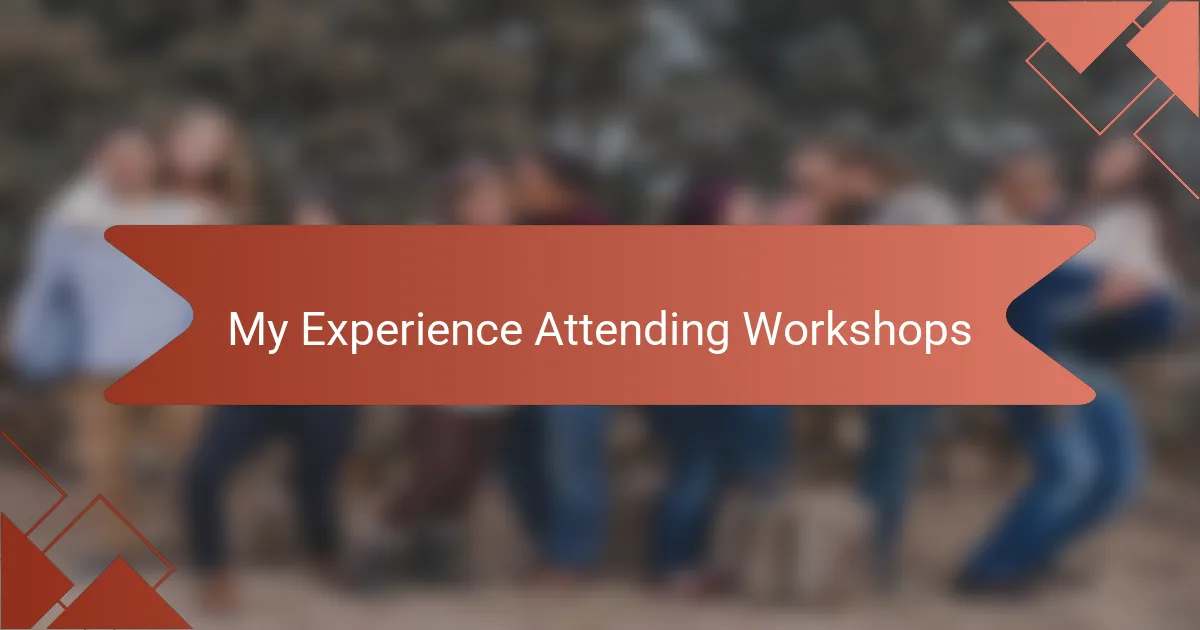
My Experience Attending Workshops
Walking into my first parenting workshop, I felt a mix of curiosity and nervousness—would I really fit in? But as the sessions went on, I found myself drawn not just to the advice but to the genuine stories shared by other parents. Have you ever been surprised by how a simple conversation can lift a weight off your shoulders? That’s exactly what happened to me.
One moment that sticks with me was during a group activity where we all talked about our biggest parenting frustrations. Hearing voices that echoed my own struggles made me realize I wasn’t alone in facing those daily hurdles. It was comforting and empowering at the same time—like finding a secret club that understands your journey without judgment.
Of course, not every workshop felt like a perfect fit. There were times I left feeling a bit overwhelmed or unsure how to apply what I’d learned. But reflecting on those moments, I see they pushed me to ask better questions and seek out facilitators whose style clicked with me. Isn’t growth often a bit messy before it becomes clear? That perspective helped me keep going and get more from each experience.
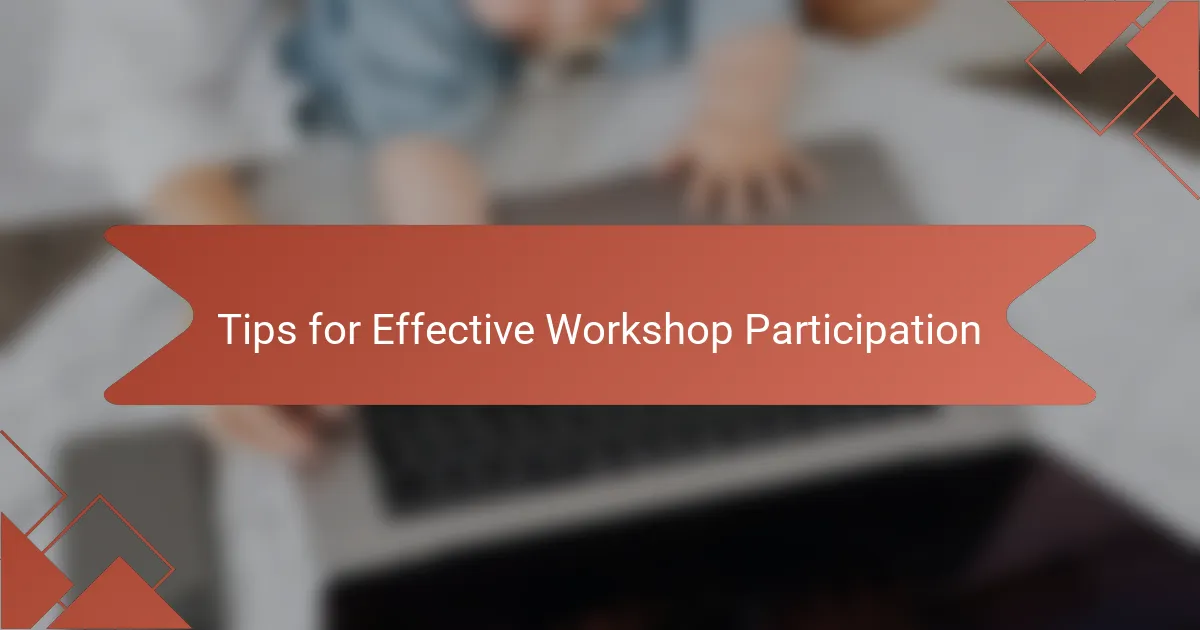
Tips for Effective Workshop Participation
One thing I found crucial for getting the most out of workshops is being an active participant. Simply showing up isn’t enough; asking questions, sharing your thoughts, or even jotting down notes keeps you engaged and helps ideas stick. Have you ever left a session wishing you had asked something? Trust me, speaking up transforms passive listening into meaningful learning.
Another tip that worked wonders for me is managing expectations. Workshops pack in loads of information in a short time, so I remind myself that it’s okay to absorb ideas at my own pace. Have you noticed that trying to tackle everything at once can feel overwhelming? Focusing on one or two takeaways per session made the experience less stressful and way more practical.
Finally, building connections with fellow attendees can turn a one-time class into a supportive network. I remember exchanging contact info with a few parents who faced similar challenges—it felt like creating allies on this parenting journey. Do you think parenting is easier when you have people to lean on? For me, those relationships continue to be one of the richest parts of workshop participation.

Applying Workshop Lessons at Home
Applying what I learned at the workshops wasn’t always straightforward. After one session on positive discipline, I tried the suggested calm-down techniques with my child, and it surprisingly shifted the mood during a meltdown. Have you ever been skeptical about a method until you tried it at home? For me, seeing real results made the extra effort worthwhile.
Sometimes, I caught myself slipping back into old habits despite the new tools I had picked up. That’s when I realized the importance of patience—not just with my kids, but with myself. Changing how we parent takes time and repetition, and applying workshop lessons became a gradual process rather than an instant fix.
I also found that sharing insights from the workshops with my partner helped keep us aligned. Discussing what we tried and what worked turned those lessons into family conversations, making the whole experience more meaningful. Have you noticed how teamwork at home can multiply the benefits of what you learn outside? It definitely did for me.